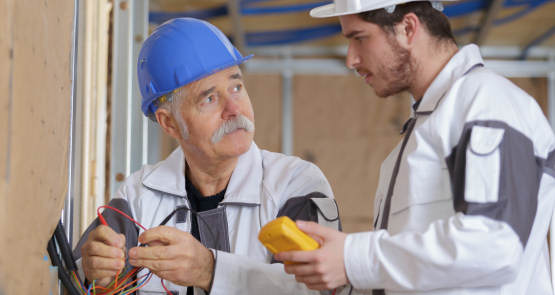It is shocking to think that there are over 800 deaths and 15,000 injuries caused every year due to fire. Of 650,000 calls to the fire service every year, 45,000 of these are to fires located within the home, which could be easily preventable with the advance warning a smoke alarm provides.
A smoke alarm is a relatively small ceiling mounted device, which will set off a loud alarm when smoke is detected. The alarm notifies those residing within the property that a fire may be present and allows those people the precious minutes needed to vacate the property in a safe manner. Smoke alarms vary in price from a few pounds for smaller battery operated devices to slightly higher priced alarms that are wired into the electrics. It is important to note that it is common for fire and rescue crew to attend properties with battery operated smoke alarms where the occupiers have unfortunately allowed the battery to run out and failed to replace with a new battery.
Also there have been cases where the owner has removed the battery in the incidence where the alarm may have been triggered by burning some toast and then forgotten to put the battery back in after cooking. Therefore although the mains powered smoke detectors cost more to install, the benefit of the mains powered alarms is that you do not need to worry about the battery running out. The mains powered smoke alarms also contain a back up battery to allow the alarm to still work in the case of a power cut. It is also possible to link smoke detectors throughout a property so if one alarm is triggered in one area of the house then all alarms will go off.
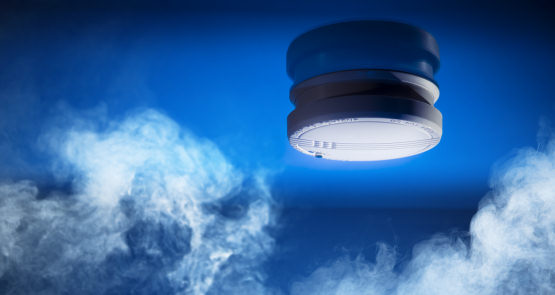
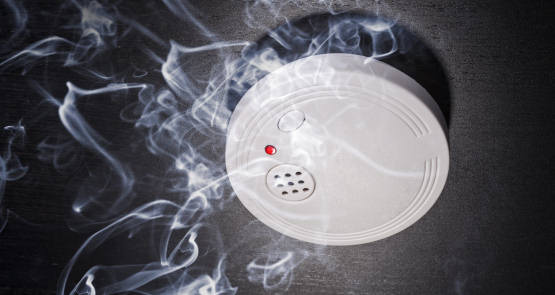
What type of smoke alarm should I get?
There are four different types of smoke alarms/detectors available, each work in different ways and is reflected in the cost. The four main types are:
The Ionisation type of smoke detectors is often the cheapest type of alarm you can get. They are small self-contained units, which mount to the ceiling and are battery powered. These alarms work but detecting small smoke partials in the air. The benefit of these alarms is that they are very quick at detecting fast burning fires like wood and paper fires before the smoke gets too thick. Cooking does however easily trigger these alarms. This can lead occupiers to be tempted to remove the battery from the device, which could prove to be a fatal mistake. Ionisation alarms have also been found to be slow at detecting smouldering fires, which produce a lot of smoke but are slow at producing flames.
The Optical/Photo electronic type of smoke detector has been found to be much more effective at detecting the larger smoke partials which are produce by smouldering and slow burning fires. These tend to be fires caused by overheated cabling or upholstery fires. Although not as effective as the Ionisation type of alarm at detecting the fast burning fires they do still detect these small smoke particles well and are less likely to be triggered by cooking. These alarms are slightly most costly then the Ionisation alarms.
The Heat type of alarms is not sensitive to smoke, but instead trigger an alarm when the temperature within a room increases from a fire. These detectors are designed to be installed within kitchens but only cover a small area so in larger kitchens you will need to install more then one alarm. These alarms are ideal in commercial kitchens where lots of smoke may be produced during cooking which would trigger an ionisation or optical alarm.
There are two different types of combined alarms:
Combined Optical Smoke and Heat Alarms - These alarms are a combination of the Optical type of alarm and the Heat type of alarm which means the number of false alarms will be less but the speed of which a real fire is detected is quicker.
Combined Smoke and Carbon Monoxide Alarms - These alarms combine a standard smoke alarm with a carbon monoxide detector in one unit. This is ideal for those not wanting to have two ceiling mounted alarms on their ceiling.
As mentioned above, smoke alarms can be battery or mains operated. There are also combination-powered alarms where they are mains powered but also contain a battery in the incidence of a power cut.
Many smoke detectors are also fitted with a silence button so you can silence the alarm quickly in the case of a false alarm.
Visual alarms, you are also able to get both sound and light alarms. These smoke alarms trigger a loud alarm but also a light in the event of smoke being detected. The light can help to illuminate a way out, which is very helpful, in the event of a smoke filled room or a fire during the night. This alarm can also be greatly helpful to those who are visually or audibly impaired and who may struggle to hear the alarm or struggle to see a clear path to exit the building. For those who are deaf it is also possible to link the smoke alarm to a pad which vibrates if the alarm is triggered, this can be placed under a pillow during the night to wake the individual.
Battery powered alarms are fitted with a low battery warning system where the alarm will start to chirp when the battery is running low, this is very useful but in the event of the alarm starting to chirp in the middle of the night most also have a hush button which will silence the chirp until the morning when you can replace the battery. Most batteries will last approximately 12 months within a smoke detector, but you can get alarms with sealed 10 year batteries so you do not need to worry about changing the battery annually.
Mains powered alarms need to be fitted by a qualified electrician and is a service we at Acorn Electrical & Mechanical (AEM) can quote and provide. Any new builds or refurbished property must be installed with mains powered smoke alarms. It is important to make sure any mains powered alarms are also fitted with a back up battery, which will take over the power supply to the smoke detector in the event of a break in the mains power.
What type of smoke alarm should I put where:
Landings - The best alarms to use in landing spaces are Ionisation alarms or combined smoke and heat alarms.
Bedrooms, living rooms and hallways - The best alarms to use are Optical smoke alarms or combined Optical and heat alarms.
Kitchen and Garage - The best type of alarms in these areas are Heat alarms.
Whichever type of alarm you choose it is essential you ensure the alarm has been certified to the British or European standard.
How many alarms should I get?
Fires can start anywhere within a property and the more alarms you have within the property the more protection they will offer. For maximum protection you should place an alarm in every room and hall except for any bathrooms. For minimum protection it is advisable you place at least one alarm on every floor.
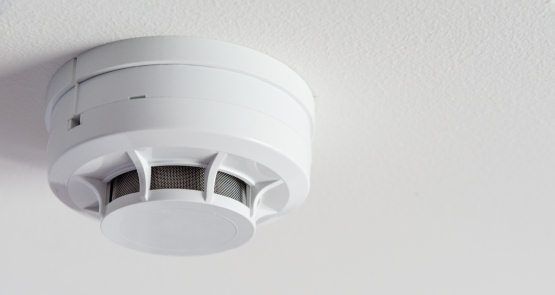
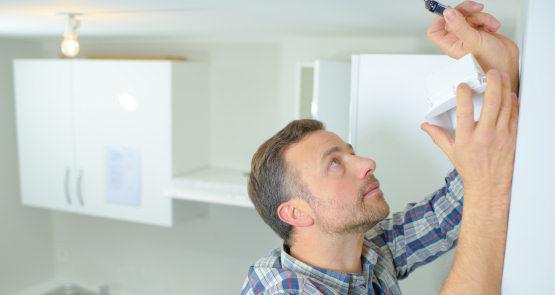
Where should I place my smoke alarms?
Smoke alarms are usually always fitted to ceilings and can be screwed or attached using adhesive pads. If you are fitting your alarm within a room try to locate it as central to the room as possible but remember to leave at least 30cm from any light fitting. Make sure the smoke alarm is in a position where the alarm will be heard loud enough to wake you if you are asleep in the bedroom.
Ideally if you are fitting only one alarm to every level of your property, then place the alarm in the hallway/landing of each floor. Remember smoke rises so locate your alarm in the highest place within the home so as to detect the smoke first.
Smoke alarm maintenance
Always follow the manufacture instructions located within the smoke alarm box, this will list all the steps needed to maintain your smoke alarm to ensure it works well when needed. Smoke alarms tend to require minimal maintenance; it is good practice to regularly test you smoke alarm using the test button located on the alarm. Make it a form of habit to test your alarm on the first of each month. Always have replacement batteries located within the house so in the event of the alarm starting to chirp to indicate a low battery you can replace the battery straight away rather then wait till you next go to the shop. Once a month use the soft brush attachment on your hoover to gently hoover over the alarm, this will help stop any cobwebs forming within the alarm filters that detect the smoke particles. Finally remember to replace the battery within your alarm every 12 months and replace your smoke alarm every 10 years.
Commercial & industrial emergency fire alarm service
In the UK, commercial & industrial fire alarm regulations can be confusing if you’re not an informed professional. So we have tried to simplify it bring you up to speed with the latest legislation.
The Regulatory Reform or Fire Safety Order 2005 (RRO) forms the fire regulations. Also recommended by the UK government is all detection systems and fire alarms, which have been installed should be maintained accordingly complying with BS 5838 of the BS Standards.
Even though all necessary literature regarding the rules regulations and standards are ready available there is still confusion regarding the précises legislation allowed.


Common frequently asked questions:
Q1. Do I really need a fire alarm?
Current regulations here in the UK require all business properties to have a fire detection system suitable for their premises so if there is a fire outbreak it can be detected immediately and all workers and occupants of the building be notified to vacate the building by the nearest exit available. This legislation does not always mean that every business property will require a fire alarm system. There is a criteria of which if your business premises falls into you will not need one such as:
IF ONE OR MORE THAN ONE OF THE ABOVE STATEMENTS DO NOT APPLY TO YOUR PLACE OF BUSINESS PREMISES THEN YOU WILL MORE THAN LIKELY REQUIRE A FIRE ALARM SYSTEM.
If you’re unsure at all then you need to have a Fire Risk Assessment carried out, which is a part of your business safety plan, to identify all areas of risk and conclude if you need an automatic fire detection system or not.
Q2. What type of fire alarm do I get?
Currently on the market you can choose between three systems that are mainly used.
These are:
UK regulations & legislation does not specifically state an exact type of system that you must use in your building. You must decide which system is most suitable for your business and building needs. We can help you design and install a tailor made system to suit you and your building needs complying with BS 5839 specification requirements giving you piece of mind that your insurance remains valid at all times.
Q3. What are the different grades & categories of fire alarm systems?
Grades define the construction of the fire alarm system and the categories define the zones or areas of the building it covers. Grades – Start at A and finish at F. A is the highest top grade with F being the lowest grade at the bottom. The Lowest grade system is usually found in residential buildings starting at D to F. They are not wired via a central control panel and usually do not have a battery power backup system fitted. A business requires a more advanced system to conform to UK rules, regulations and legislation so they require a system grade from A to C. These higher-level systems are directly wired via a central panel fed by mains power and have a form of backup power supply.
Categories – This is split into two (P & L) systems:
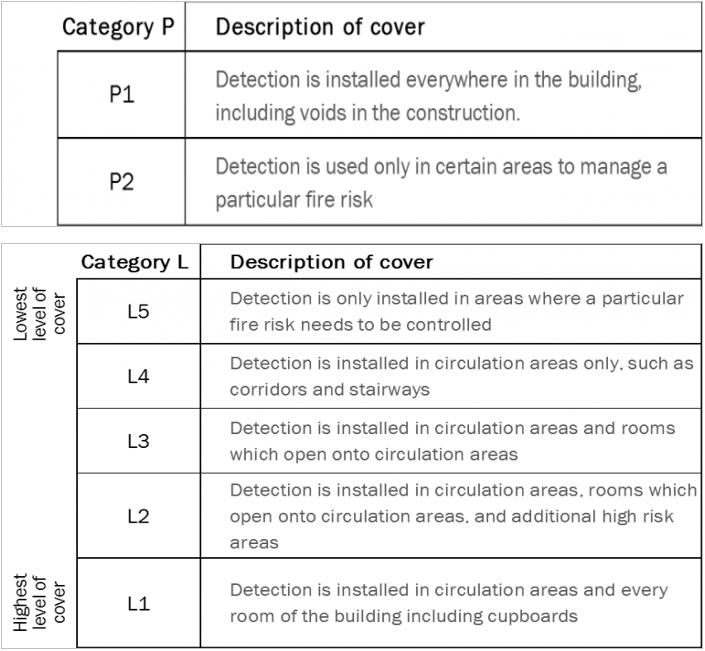
The category and grade of a fire alarm system you require is determined on the layout, size, nature and infrastructure of your business and the size of the building. All information regarding the correct category and grade of the fire alarm system you require will be contained in your Fire Risk Assessment or we can help you design and install a tailor made system to suit you and your building needs complying with BS 5839 specification requirements giving you piece of mind that your insurance remains valid at all times.
Q4. Who can install my fire alarm system?
There is no legislation in the UK as to who is allowed to install a fire alarm system. The only stipulation is that they must be a competent person. With this in mind any person installing a fire alarm system must abide the following:


Q5. How often will my fire alarm need servicing?
The regulations here in the UK only require your system to be ‘adequately maintained’. Recommendations from the government and BS 5838 say that a competent person should carry out an inspection every six months.
To be safe if your business premise is on the large side it is advisable to carry out a service every three months so as to avoid one of the many components in your system from failing.
Q6. Why is the servicing important?
It is important to keep your fire alarm system in good working condition for two reasons:
Reason one is just obvious but the second reason is often overlooked but can cost a business a considerable amount of money over the year.
False alarms also cost money to the civil servant government bodies such as the fire brigade and police. It can take up valuable time and resources that could be required on a real emergency situation. Its also prudent to remember that if your business has a track record of false emergency call outs, the fire brigade will now levy charges against your business. So it’s a good idea all round to keep your system serviced and maintained.
Q7. Why do I have to do a weekly test on my fire alarm system?
When performing a weekly test it is very different from having it serviced. A service is a like an MOT for a car. It is thoroughly inspected to find fault in any way. A test performed weekly is like you checking the water and oil in your car. It’s a spot check to clarify its working ok and to single out any problems. It is a regulatory requirement necessity for buildings and premises that require them so weekly testing is vital and important.
This is stipulated in BS 5839 of the British Standards regulations set by government. If you do not comply with these regulations and got found out or caught you will be held liable and asked to explain your actions on an investigation from a fire officer.
Q8. How do I do a weekly test on my fire alarm system?
You can assign a ‘responsible person’ to perform a weekly test to your fire alarm system. Or, if you own a number of buildings containing fire alarms it may be prudent to assign a fire alarm company to this on your behalf. On each test the minimum required is for one fire alarm call point to be activated and confirm that the panel receives the activation and the alarm is set off. A different call point should be chosen each week.
When a successful test is completed just reset the fire alarm control panel and record the check and location of the test in the fire alarm logbook. However, if a problem arises immediately contact your chosen fire safety company.
Q9. What do I do if something goes wrong?
Things that can go wrong are:
In the event of any of the above happening you must notify your fire protection company immediately. They need to respond on site within 24 hours of you notifying them for minor faults and within 4 hours for a major fault. If a fault occurs the system cannot be considered as ‘adequately maintained’ making you and your business non compliant with current fire alarm regulations.
Please feel free to call us for help or advice.
If you are interested in booking a survey for any of our services or just a safety check, please contact Acorn Electrical & Mechanical (AEM) and a member of our team will be happy to help or advise you. CALL now on 01752 201077 or 07779 777965
